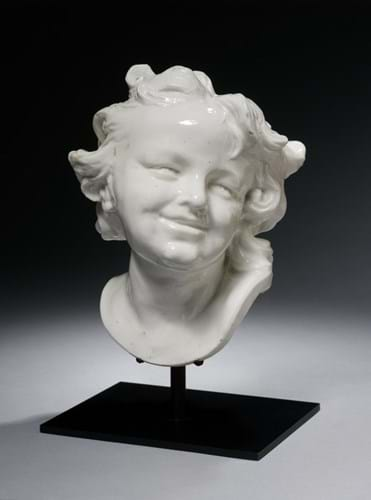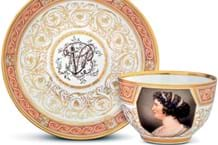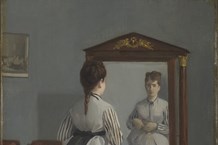
Head of a Laughing Child c. 1746–49 was first unveiled at auction in 2013 after its chance discovery at a French flea market.
Only one other porcelain example of the 8in (20cm) model is recorded – that in the Ashmolean Museum decorated (probably at a later date) with coloured enamels.
The identities of the subject and the sculptor of the bust have been much discussed by scholars and collectors. The V&A is now almost certain it was modelled by Louis François Roubiliac (1702-62), the French sculptor working in London in the 1740s who was friends with the silversmith and entrepreneur Nicholas Sprimont (1716-1771), proprietor of the Chelsea porcelain factory.
It may represent Sophie Roubiliac, daughter of the sculptor and Sprimont’s goddaughter. Roubiliac would have made the head in clay (approximately 20% bigger than the resulting porcelain model) and from this multi-part plaster moulds were taken. It was slip cast as a single piece.
Significant piece of English porcelain
While the Ashmolean head is much published (discovered in 1938, it has been in the museum’s collection since 1965) the V&A’s model, left in the white as the potter intended, is a relatively new discovery. It was bought in south west Brittany in 2011 by retired porcelain dealer Louis Woodford, who recognised it as a significant piece of English porcelain.
In 2012 the two heads were brought together for comparison. The plain white sculpture has been deemed more aesthetically pleasing, and its firing seems to have been more successful. The glassy body and glaze, as well as the surface pitting, are typical of the early period at Chelsea.
The piece was offered for sale at Bonhams in April 2013 with a 'refer to department' estimate and predictions of a new record for English porcelain at auction, which stands at a premium-inclusive £223,650 paid for a Chelsea ‘hen and chicks’ tureen at Christie's in 2003. At the time the auctioneers said it had been in a private collection for many years, the owners ‘displaying it on the mantlepiece in their house, on top of a wine bottle.’
National collection
Although it failed to sell in the saleroom, such an important piece later proved a target for the national collection. It has been acquired for an undisclosed sum with support from the Art Fund and is now on display in the V&A’s British Galleries alongside some of the earliest examples of English porcelain, including Roubiliac’s figure of William Hogarth’s dog Trump made by the Chelsea c.1747-50.
Reino Liefkes, head of ceramics at the V&A, said: “Roubiliac’s Head of a Laughing Child is one of the most exciting discoveries in ceramics for many years. This vivacious sculpture is one of the most fluently modelled examples of English sculptural porcelain ever produced and I’m thrilled it joins our collection.”





